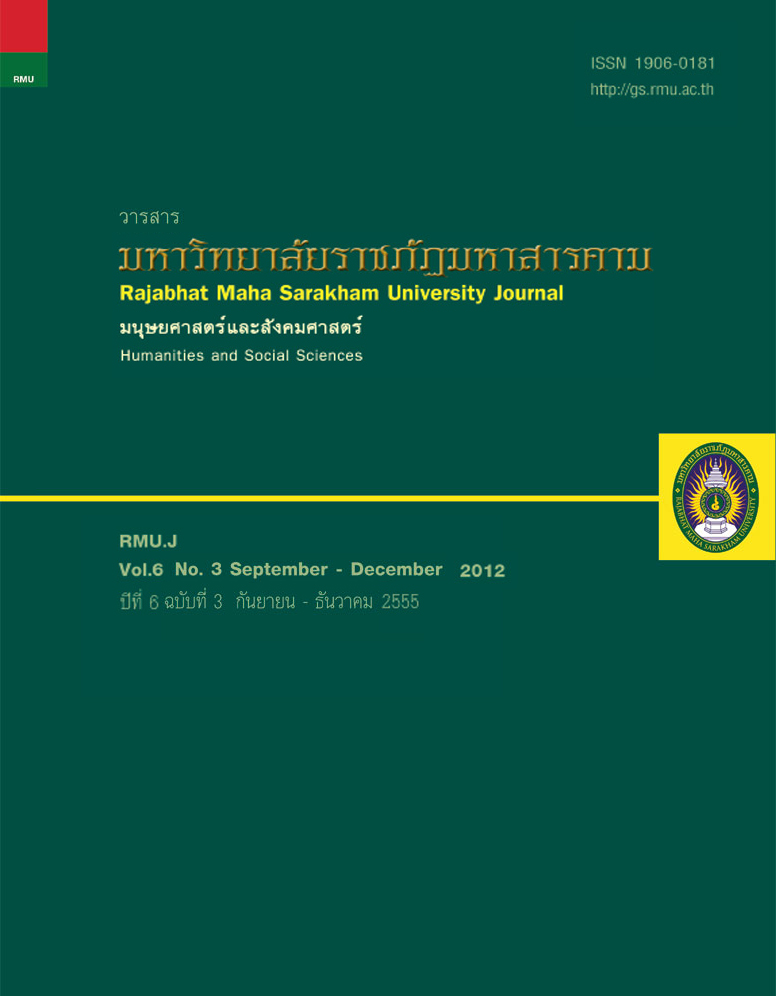Classroom-Related English Vocabulary Learning Strategy use of Undergraduate Students : A Case Study of Rajabhat Maha Sarakham University
Main Article Content
บทคัดย่อ
บทคัดย่อ
กลวิธีการเรียนรู้คำศัพท์ภาษาอังกฤษ หมายถึง วิธีการหรือพฤติกรรมการเรียนที่ผู้เรียนใช้ในการเรียนรู้คำศัพท์ภาษาอังกฤษ ซึ่งแต่ละคนย่อมมีกลวิธีเฉพาะของตนเองในการเรียนรู้คำศัพท์ภาษาอังกฤษ การวิจัยครั้งนี้มีวัตถุประสงค์ เพื่อศึกษากลวิธีและความถี่ของการใช้กลวิธีในการเรียนรู้คำศัพท์ภาษาอังกฤษในชั้นเรียนของนักศึกษาระดับปริญญาตรี มหาวิทยาลัยราชภัฏมหาสารคาม กลุ่มตัวอย่างเป็นนักศึกษาระดับปริญญาตรีที่ศึกษาในคณะวิชา/สาขาวิชาเอก และชั้นปีต่างๆ ปีการศึกษา 2551 มหาวิทยาลัยราชภัฏมหาสารคาม การเก็บรวบรวมข้อมูลแบ่งเป็น 2 ระยะ คือ ข้อมูลเชิงคุณภาพ เก็บจากนักศึกษา จำนวน 28 คน โดยการเลือกแบบเจาะจง และใช้วิธีการสัมภาษณ์เป็นรายบุคคลแบบกึ่งมีโครงสร้าง (One-to-one semi-structured interview) และข้อมูลเชิงปริมาณ เก็บจากนักศึกษาจำนวน 1,181 คน โดยการใช้แบบสอบถาม นำข้อมูลที่ได้จากการสัมภาษณ์มาวิเคราะห์เนื้อหา (Contentanalysis) โดยวิธีการใส่รหัสและรหัสแกน (Open and axial coding) ผลการวิเคราะห์ข้อมูลเชิงคุณภาพ พบว่า กลวิธีการเรียนรู้คำศัพท์ภาษาอังกฤษในชั้นเรียน แบ่งเป็น 2 กลุ่ม คือ 1) กลวิธีในการหาความหมายคำศัพท์ภาษาอังกฤษในชั้นเรียน มี 14 กลวิธี และ2) กลวิธีในการจำความหมายคำศัพท์ภาษาอังกฤษ มี 21 กลวิธี
คำสำคัญ : คำศัพท์ภาษาอังกฤษ, การเรียนรู้คำศัพท์ภาษาอังกฤษ, กลวิธีการเรียนรู้คำศัพท์ภาษาอังกฤษ ,นักศึกษาระดับปริญญาตรี มหาวิทยาลัยราชภัฏมหาสารคาม
ABSTRACT
English vocabulary learning strategies (VLSs) refers to any special techniques or leaning behaviours which language learners use for their vocabulary learning, and each language learner has his own way for vocabulary learning. The present investigation is aimed at examining types of English vocabulary learning strategies and frequency of strategies of undergraduate students reported using in classroom-related settings in order to serve the particular purposes of their vocabulary learning. The samples consisted of undergraduate students studying in different major fields, and years of study in the academic year 2009, at Rajabhat Maha Sarakham University (RMU). Data were collected within 2 phases: qualitative data were obtained from 28 students through the purposive sampling technique and a one-to-one semi-structured interview was employed, and quantitative data were obtained from 1,181 students through questionnaire. The interview data obtained were transcribed, analysed, and categorised for the content analysis through the ‘open and axial’ coding technique. The findings revealed that vocabulary learning strategies in classroom-related settings were categorised into two main categories: 1) strategies for discovering the meaning of new vocabulary items comprising 14 individual strategies; and 2) strategies for retaining the knowledge of newly-learned vocabulary items comprising 21 individual strategies.
Keywords : English Vocabulary, English Vocabulary Learning, English Vocabulary Learning Strategies, Undergraduate Students
Article Details
1. บทความที่ลงตีพิมพ์ทุกเรื่องได้รับการตรวจทางวิชาการโดยผู้ประเมินอิสระ ผู้ทรงคุณวุฒิ (Peer Review) สาขาที่เกี่ยวข้อง อย่างน้อย 3 ท่าน ในรูปแบบ Double blind review
2. ข้อคิดเห็นใด ๆ ของบทความที่ลงตีพิมพ์ในวารสารมหาวิทยาลัยราชภัฏมหาสารคาม นี้เป็นของผู้เขียน คณะผู้จัดทำวารสารไม่จำเป็นต้องเห็นด้วย
3. กองบรรณาธิการวารสารมหาวิทยาลัยราชภัฏมหาสารคาม ไม่สงวนสิทธิ์การคัดลอกแต่ให้อ้างอิงแสดงที่มา


